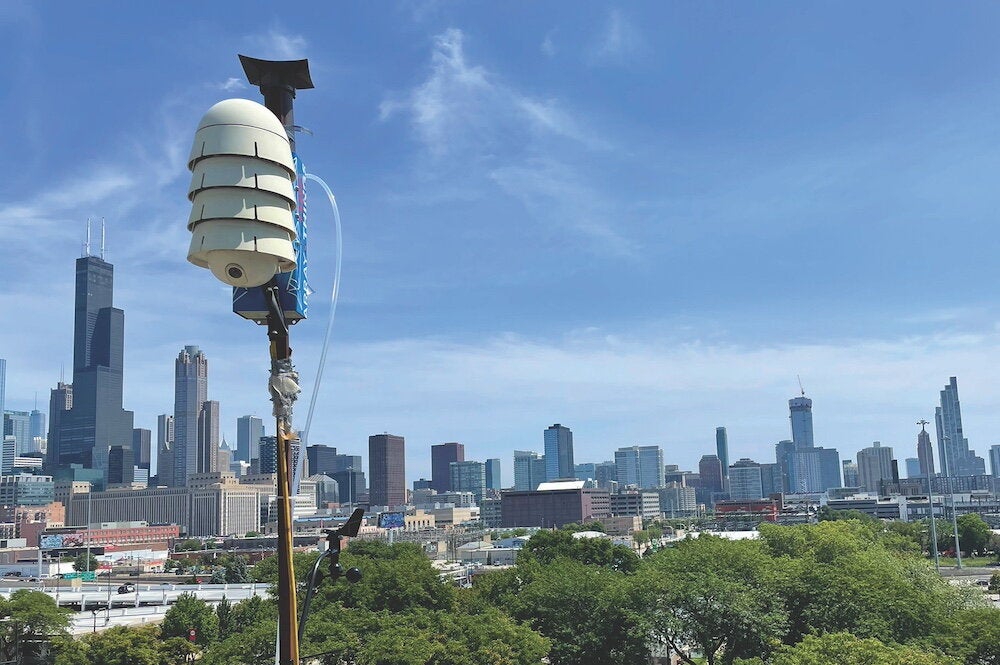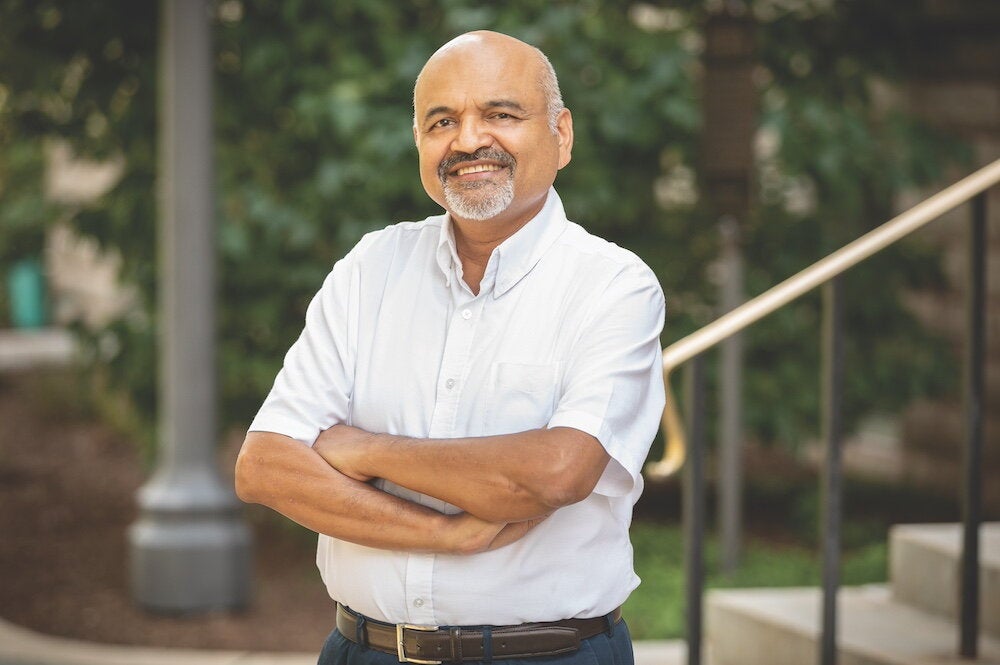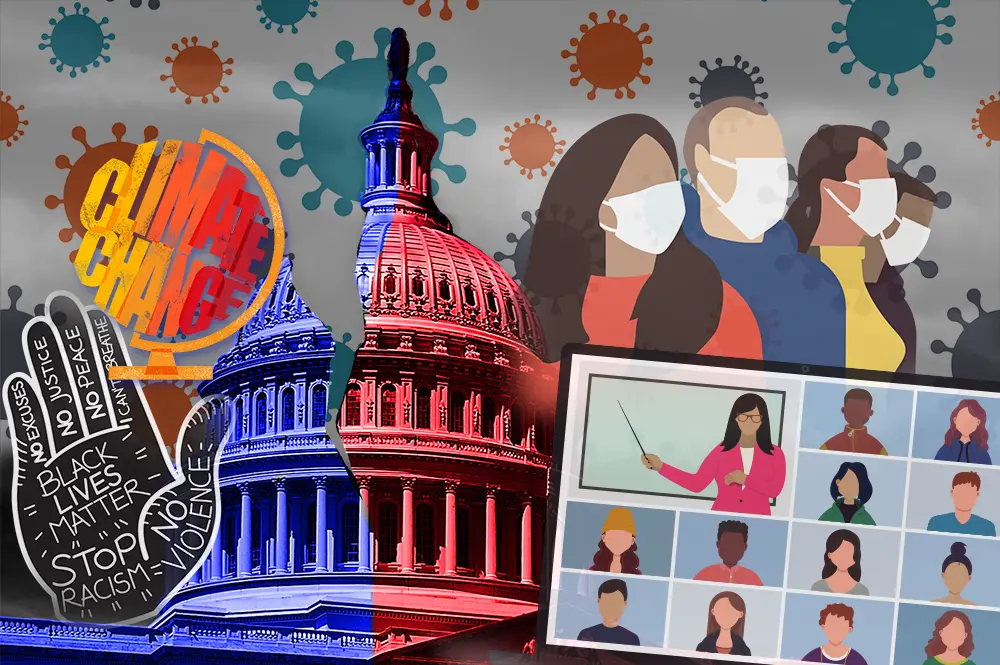
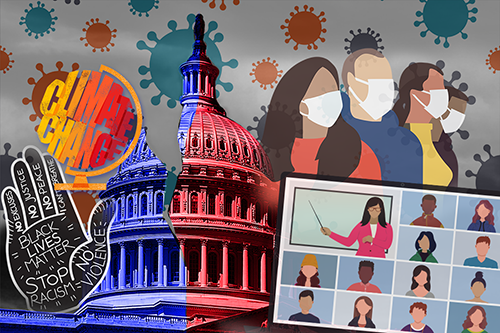 How do we move forward from here?
How do we move forward from here?
The year 2020 was hard, but it also summoned thoughts on how to start anew. We’ve asked LAS professors for their thoughts on how—in light of the pandemic, racial tensions, isolation, environmental issues, political divisiveness, and other trials of 2020—we can still move toward a brighter future. Editor's note: Replies received in December 2020.
On the environment:
Donald Wuebbles, Harry E. Preble Professor, atmospheric sciences
It is extremely important to all life in the United States and beyond to restore many of the protections for our environment that were carelessly removed or altered for commercial reasons during this last administration. It is also important that we rejoin the Paris Agreement to protect our climate, and that the United States provide leadership in getting all countries to work with us in reducing the emissions that affect future changes in climate. This means transitioning our energy and transportation sectors, while continuing to build our economy, to eventually eliminate human-related carbon emissions that drive the changes in climate. A long-term plan for this transition needs to be put into place that all of us can agree to. We need to emphasize the development of pathways and technologies that will allow us to make that transition. We also need to put an emphasis on making our communities, our cities and our industries more resilient to the changes in climate that will still happen even while we slow down future climate changes. The use of solar and other renewable sources of energy need to continue to increase; these also have a positive impact on our economy. Reducing pollution and climate-related emissions while not hurting jobs and while minimizing impacts on the economy needs to be carefully considered.
On higher education:
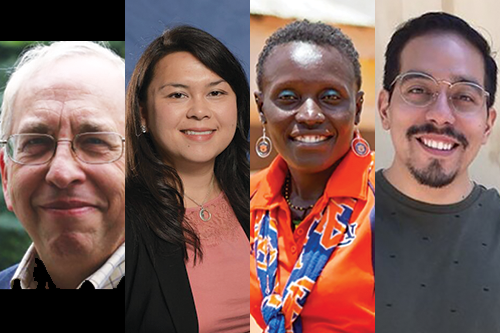
Charee Thompson, communication
To say that the pandemic has fundamentally changed how I teach and learn would be an understatement. Online learning has certainly presented numerous challenges and barriers—I know I certainly miss the rewards of being physically co-present—but it has also motivated my students and me to foster a virtual learning community committed to connection and resilience. There are several lessons I will carry with me long after we are done quarantining and social distancing. First, the pandemic laid bare the vulnerabilities many students face regularly, including financial precarity, caregiving responsibilities, and access issues. I am grateful students were willing to share with me how they juggled working more hours with their schoolwork to help at home, how they managed no or poor internet connection and limited device capabilities, and how they needed and provided social support to others for mental health. I am committed to making sure students feel seen and heard and to be supporting them in their unique situations. Second, my pedagogy has increasingly been defined by flexibility—often because it had to shift and adapt during these uncertain times. I am committed to flexibility because it has freed my students to focus on mastery of ideas and given them a sense of autonomy over their learning.
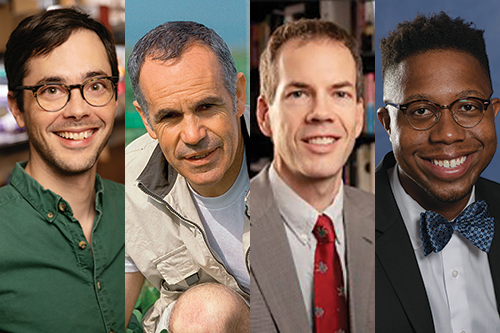
On equitable food solutions:
Esther Ngumbi, entomology and African American studies
Food insecurity in the United States and around the world continues to rise in part because of the COVID-19 pandemic. In 2020, we witnessed food systems disruptions in rural and urban cities alike. The pandemic exposed the fragility of our existing food systems. Moreover, it also made it clear that hunger and food insecurity disproportionally impact marginalized communities and people of color. Meanwhile, we continued to witness many environmental issues such as drought and flooding, all linked to the changing climate. Impressively, measures and initiatives that were in existence and available to citizens before the pandemic including foodbanks and several federal benefits really made a difference.
Moving on to 2021, there is an urgent need to ramp up the initiatives that worked and to further use knowledge and lessons learned during the pandemic to create policies and solutions to mitigate this worrying trend, create equitable food systems and to strengthen food production at the household, community, and national level.
Concrete solutions and initiatives to mitigate food insecurity must be rooted in data evidence. Institutions like the University of Illinois Urbana-Champaign are better placed to continue to harness research, discovery, engagement, learning and extension to meet our collective food needs.
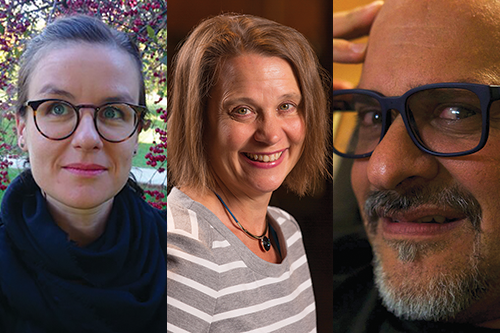
On technology and education:
Rodrigo Delgado, Spanish and Portuguese
Technology became both a hero and a villain in an uncertain time. Zoom made it possible to teach remotely and safely from the “comfort” of our homes, but also revealed that not every student has the privilege to attend class from a “comfortable” place. There is a chasm between first-generation, underrepresented students and their counterparts. Speaking from my own personal experience, I could imagine that taking a class via Zoom as an undergrad would have meant logging in to Zoom from my family home on a cheap laptop (because that is all we could afford). I would also be surrounded by the eight other people living there, none of whom completed college. Going forward, we must keep in mind: Not all students are the same. We must pause to be aware of our first-generation, underrepresented students who cross these borders of privilege in ways that often go unrecognized.
On pandemics of the future:
Chris Brooke, microbiology
The massive impact of COVID-19 has made painfully clear how vulnerable we remain to viral pandemics and has exposed and intensified weaknesses and inequalities that were already present in our society. In many ways, our national response to this pandemic has been a complete disaster. Due to a complete failure of leadership at the top of the federal government, the deployment of the tools and expertise that we have honed over decades to fight viral outbreaks such as this one were hobbled, resulting in massive amounts of avoidable death and suffering. To mitigate the impact of the inevitable pandemics of the future, we must commit to major long-term investments in public health infrastructure and research, as well as a social safety net that can sustain those whose lives are upended by events beyond their control.
On the science of food supplies:
Stephen Long, Ikenberry Endowed University Chair of Crop Sciences and Plant Biology
Photosynthesis is directly or indirectly the source of all of our food and much more. No institution in the modern era has made more contributions to understanding the mechanism than the University of Illinois. Now, through the Bill & Melinda Gates Foundation, U of I leads an international consortium (RIPE) that is converting this understanding via artificial intelligence to predict how the process can be made more efficient and in turn bioengineering these changes into crops to achieve sustainable yield increases. Test-of-concept has demonstrated three independent lines of bioengineering that have resulted in large production increases, in one case a 30 percent increase in soybean yield on our university farm. Now the team is focusing on future-proofing these traits and moving them into the staple crops of sub-Saharan Africa. Globally, this new route to increasing crop yields will benefit the environment by requiring fewer inputs per unit of harvest and avoiding the need to cultivate yet more land to meet growing demand.
On politics:
Brian Gaines, political science
It once seemed likely that a strong economy would deliver a second mercurial Trump term. A global pandemic demolished that trajectory, knocking Donald Trump from power, narrowly. But a return to “normalcy” in 2021 looks unlikely. With record caseloads and a post-holiday surge, COVID-19 is unvanquished. Competent, apolitical management of the nascent vaccination program is step one, but Joe Biden must also exhibit creativity beyond what was in evidence in his low-profile, defensive campaign. With Biden operating with the double-edged sword of unified Democratic government, the tone of disgusted disgruntlement that prompted opponents of Trump to posture as “resistance” will persist, in mirror image. Convinced that the election was stolen, a large chunk of the electorate is surly. To deliver on unifying the nation as his predecessor did not, Joe Biden will need immense skill, juggling demands from left, center, and right.
On race and food security:
Bobby J. Smith II, African American studies
When Illinois Governor Pritzker issued a statewide stay-at-home order in March 2020 in response to COVID-19, I thought about the countless Black people who would go hungry. I thought about empty grocery shelves and Black children who use school systems for daily nutrition. Even though the order has since been lifted, I still grapple with such realities. Yet, as the world rushes to get back to “normal” amid persistent racial tensions, there remains a painful silence around Black food insecurity. To be sure, many Black folks are simultaneously creating food projects to resist “normal” conditions and hoping that things don’t go back to “normal.” And that’s the lesson. If “normal” rendered the most vulnerable in general, and Black people in particular, food insecure, then those of us who are committed to social justice across all university levels must actively imagine a new normal that places (food) justice at the center.
On truth and democracy:
Julie Gaillard, French and Italian
In March 2020, an eminent French epidemiologist triumphantly announced that he had found a cure for COVID-19: hydroxichloroquine. In spite of unanimous warnings from the scientific community that his protocols were unreliable and his results insignificant, he was hailed like the Messiah. But who could blame people for placing their faith in a scientist?
2020 has been a series of contrafactual, inconsistent communication by government officials, in France just as in the U.S. Scientists warn against an airborne virus? “It is not useful to wear a mask.” People of color and political opponents are brutalized, maimed, or killed on camera? “There is no such thing as police violence.” To make sure it is the case, France is currently debating laws limiting the publication of images of the police and restricting academic liberties when it comes to the study of race.
What happens when those who have been elected to uphold democracy against the rise of fascism no longer handle factual truth as what is established through evidence-based protocols, but as an effect of discourse? Hannah Arendt famously wrote that truth is “the ground on which we stand.” As the ground is being taken from under our feet, the most dangerous of messianic figures seem to have a bright future ahead of them.
On education:
Laurie Johnson, Germanic languages and literatures
The COVID-19 pandemic has
made inequities in education even more obvious. My daughter in high school joins her online classes with an excellent internet connection; some of her classmates need to find Wi-Fi hotspots and take class in their cars. Some of our students are struggling with extra jobs, depression, and food insecurity.
Educators have had countless conversations this past year about how online teaching and meeting addresses (or doesn't address) those inequities: Does disembodiment really affect education negatively? Are students getting the mental health resources they need during this simultaneously over-connected and disconnected time? Is in-person teaching somehow automatically “better,” and why?
The LAS Life + Career Design Lab is one example of a campus unit that has pivoted meaningfully to offer intellectual and practical guidance for students in a world no one saw coming. The students who take advantage of such resources are turning adversarial conditions into growth. They are beginning to see the degree less as an end in itself, and more as another aspect of an overall intellectual and psychological trajectory that they are very actively co-creating. I’ve never seen students as deeply involved in every choice, every moment of their college experience as I do now.
On confronting racial inequality:
Gilberto Rosas, anthropology and Latina/Latino studies
Only a deep reckoning with deep processes of racialized dispossession can liberate us from our confinements. In August 2019, my hometown of El Paso, Texas, experienced a mass shooting. It targeted a so called “Hispanic invasion,” as the executioner wrote, killing more than twenty and wounding another twenty plus men, women, and children, at a local Walmart on a weekend morning before school began. The shooting occurred in the wake of the horrendous practices of family separation, which began, again, in El Paso, and has links in settler and anti-Black logics.
A virulent pandemic has brought the United States to its knees, killing more than 300,000 people, sickening tens of thousands more, and again, overwhelmingly affecting Native Americans, Black, and Latinx communities, many of whom labor in some essential segment of our way of life. They cannot work behind the safety of glowing screens. Nor can they riot mask-less, armed, and en masse in our nation’s capital.
Editor's note: This story originally appeared in the Spring 2021 issue of LAS News magazine.

